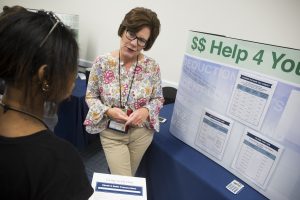April is National Financial Literacy Month! Celebrate National Financial Literacy Month by learning about LOMO. Read on to learn about LOMO, how you can participate, and how LOMO aligns with the FL State Standards.

What is LOMO?
LOMO stands for Living On My Own. Pronounce the acronym as lo-mo. Living On My Own is a real-life simulation for youth to engage in financial decisions as an adult. Before participating in the simulation, youth are provided financial education to prompt background knowledge on the financial decisions they will be making in the simulation. Students can explore careers, understand paycheck deductions, and learn essential banking topics such as debit cards and checks.
Who can participate?
The simulation is intended for high school audiences. Summer camps, youth organizations, 4-H clubs, and more can participate in LOMO. Teachers of the Financial Literacy and Money Management class can find this course a valuable tool for students to apply their financial literacy knowledge to a real-life scenario.
LOMO is not designed for middle school or elementary school age groups. It is important to note that some middle school groups succeed with the Living On My Own simulation. These groups often provide the middle schoolers with additional education sessions before the simulation. This allows the students to gain financial literacy skills to be successful.
The simulation has also been provided to teachers as a professional development learning activity. The teachers were able to dive right into the simulation with little pre-education. The intentions of the activity were to provide teachers with the reality their students and their families face every day.
Can LOMO be requested?
If you are interested in having the simulation for your youth organization or group, you can reach out to your local 4-H Extension Agent or FCS Extension Agent.
Things to consider before requesting:
- Groups of 50 to 110 students are best for the simulation
-
- Larger groups allow students to have conversations with each other during the simulation as they handle the real-life scenarios.
-
- If your group does not fit in that range, we can still attempt to host the simulation. Please contact your local county extension office to discuss the format.
- Educational pre-sessions are needed before the simulation
-
- Background knowledge specific to LOMO is necessary for students to complete the simulation.
- Volunteers are needed to operate the hands-on simulation

4H youth and adult volunteers participating in the Living On My Own (LOMO) curriculum. UF/IFAS Photo by Tyler Jones
-
- It is excellent for community faces to be present in the simulation. For example, a banker could be present to run the banking services station.
-
- If your organization/group has additional adults who can volunteer, please invite them to join us – your extension agent can train them to run a station efficiently.
How is LOMO aligned to FL State Standards?
Based on the Florida State Standards for the Financial Literacy and Money Management (2102371) course for high school students, Living On My Own is either partially or fully aligned with the 14 standards of the course. The course also supports 3 of the Mathematical Thinking and Reasoning Standards. For more details on the specific standards LOMO aligns with, contact Josey Pearce Keener at josey.keener@ufl.edu.
Notes for St. Lucie County Residents
If you want LOMO for your youth organization, then please contact 4-H Program Specialist Candy Wickham at wickham.c@ufl.edu. For adult organizations, then please contact Family Consumer Science Agent Josey Pearce Keener at josey.keener@ufl.edu.
For more information on:
- 4-H – contact John Ferguson at john.ferguso@ufl.edu.
- Financial Education – contact Josey Pearce Keener at josey.keener@ufl.edu.
Sources:
Personal Finance and Money Management 2102371, CPALMS, https://www.cpalms.org/PreviewCourse/Preview/22612
 0
0

